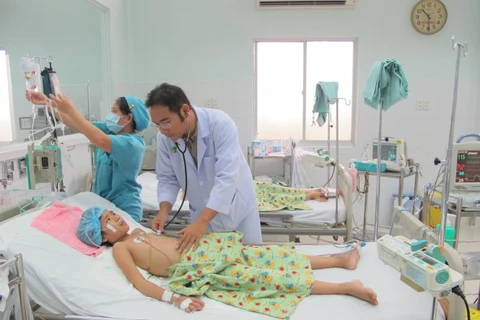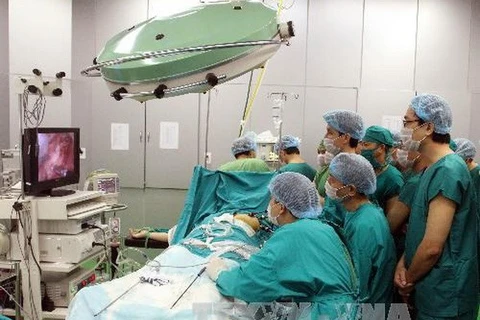Can Tho (VNA) - The Mekong Delta region faces a severe shortage of medical specialists in five specialised departments of tuberculosis, leprosy, mental diseases, anatomical pathology and forensic medicine, heard participants at a conference earlier this week.
The region, consisting of 13 provinces and cities, has 123 general hospitals and 37 specialised hospitals, 21 of which offer medical examination and treatment in the five specialised departments.
Speaking at the conference on medical staff training on August 15 , Head of the Training Department of Can Tho University of Medicine and Pharmacy – Nguyen Thi Minh Phuong said the whole region had only 152 specialists working in the five specialised departments and half of them would reach retirement age by 2020.
She noted that every city and province in the region has a centre of forensic medicine but only four of the centre staff had graduated from a forensic medicine department while the others learned a different major.
Moreover, no hospital in Kien Giang Province has doctors specialised in tuberculosis. Five provinces of An Giang, Ben Tre, Can Tho, Hau Giang and Kien Giang did not have surgical pathologists who are needed at any cancer department at province-level hospitals, she said.
According to the Ministry of Health, Vietnam ranks 12th out of the top 22 countries most affected by tuberculosis, with 130,000 new patients a year.
But 332 of 1,611 communes in the Mekong Delta do not have such specialists.
A Government decision issued in 2013 on national healthcare strategy stipulated that the aim is to provide eight doctors and two pharmacists with a bachelor’s degree for every 10,000 people in 2015; nine doctors and 2.2 pharmacists for every 10,000 people in 2020.
However, until last year, the Mekong Delta failed to meet the objective with only 6.35 doctors and 1.39 pharmacists for every 10,000 people.
The university principal Pham Van Linh said that the university continued offering training programmes to students who received financial support from provincial budgets and committed to work at the localities that fund them.
In the school year 2016-2017, the university planned to enroll 150 students for the five specialities.
Vice Director of Bac Lieu Province’s Health Department Nguyen Minh Tung said that the province had enough doctors working in general practices but lacked doctors in the five specialised faculties.
Particularly, he said, a new 100-bed tuberculosis hospital would go into operation next year, needing about 30 specialists but now there is a lack of tuberculosis doctors in the province.
The lack of such medical specialists was more severe in public hospitals, as private ones offered better policies to attract trained staff, he said, adding that at least 14 doctors in the province quit jobs at public hospitals to work for private ones.
Vice C hairman of An Giang Province People’s Committee Nguyen Thanh Binh said that the brain drain happened when local medical students wanted to work in major cities instead of returning to their hometowns.
V o Trong Huu, Head of Social and Culture Affairs Department under the Steering Committee for the Southwestern Region said that it was an urgent need to add more staff for five specialised departments in hospitals in the Mekong Delta region for better public health.
The Steering Committee, Can Tho Medical and Pharmacy University plus the Ministry of Education and Training agreed that the university would receive 150 students to the five specialised departments.
Huu called on localities to complete lists of eligible candidates and arrange proper budget to ensure the smooth operation of the training programme.-VNA























